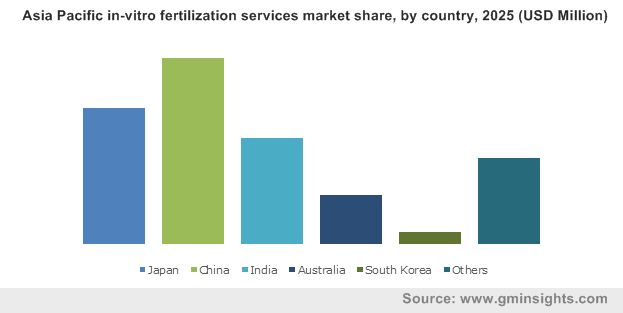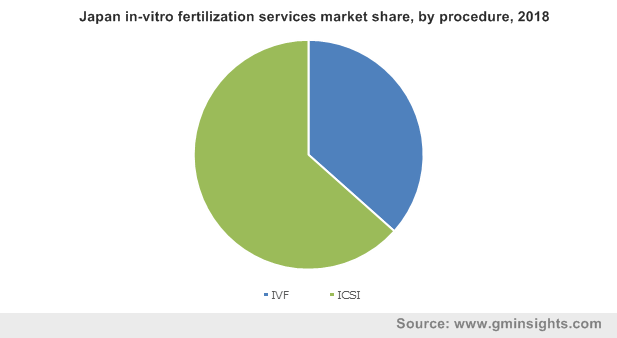Home > Healthcare > Medical Services > Inpatient and Outpatient Services > In-vitro Fertilization Services Market
In-vitro Fertilization Services Market Analysis
- Report ID: GMI3441
- Published Date: Jun 2019
- Report Format: PDF
In-vitro Fertilization Services Market Analysis
IVF market accounted for a total value of USD 4.2 million in 2018 and is expected to grow at a robust rate in the future. Couples across the globe are seeking IVF treatments owing to greater chances of conceiving and high success rate. As per German IVF Registry Annual Report, in 2017, IVF consisted of about 16% of all the assisted reproductive procedures. High success rate coupled with greater awareness about the procedure should augment IVF market growth in coming years.
Intracytoplasmic sperm injection (ICSI) segment dominated the overall market and is forecasted to expand at 6.4% CAGR during the forecast timeframe. The procedure allows men with impotency to impregnate their partners that will increase customer preference in the forthcoming years. ICSI technique is utilized to overcome severe male infertility. Hence, the above-mentioned reasons will propel market growth in the future.
People below the age of 34 years tend to opt for IVF services and accounted for market share of about 40.7% in 2018. Decreasing fertility rate is attributed to growing adoption of IVF services. As per the Centers for Disease Control and Prevention (CDC) data, the number of births dropped by 2% in U.S. between 2017 and 2018. Also, rising awareness about various advantages of IVF services among women aged below 34 years will further propel segment growth.
IVF services procedures are growing at a robust rate among the middle-aged population. Adoption of IVF services among people between the age group of 35-39 years is expected to grow at 7.7% during the forecast timeframe. Factors such as rising infertility, growing awareness about IVF services, improving reimbursement scenario across European countries and growing disposable income are the major factors augmenting the segment growth.
Hospitals segment accounted for USD 2.4 billion in 2018. High growth rate is attributed to rising number of patients opting for assisted reproductive technology. As per research paper published in Journal of Pregnancy and Child Health, about 40-60% hospital outpatient consultations in Nigeria were for issues associated with infertility. Thus, high adoption of ART to overcome infertility problems will impel assisted reproductive technology market growth.
Fertility centers market is forecasted to grow at 9.1% across the forecast timeframe. Advancements in assisted reproductive technology coupled with rising demand for infertility treatment will be the major drivers of the fertility clinics segmental growth. As per Centers for Disease Control and Prevention (CDC) report, the number of fertility clinics operating in U.S. rose from 463 to 499 between 2014 and 2015. Increasing procedural number in clinics owing to shorter duration and greater accessibility will highly impact fertility clinics segmental growth in forthcoming years.

U.S. IVF services market held majority share of 88.2% in the year 2018. Rising prevalence of infertility coupled with presence of large number of fertility clinics and centers will boost regional growth across the forecast timeframe. As per World Bank Data, fertility rate in U.S. reduced from 2.1 to 1.7. between 2007 and 2017. Growing infertility issues coupled with rising number of fertility clinics and centers will boost market growth in the region.
India is estimated to show significant growth of 16.3% during the forecast period due to rising number of IVF treatments along with various government initiatives to increase awareness about infertility and advantages of IVF procedures among people. For instance, Indian government funds a program named ‘Jiyo Parsi’, a program that provides free IVF treatment to Parsi community. Furthermore, growing awareness about advantages of IVF procedures will render positive effect on India IVF services market.

